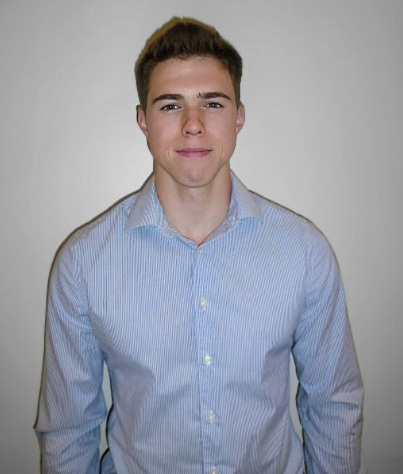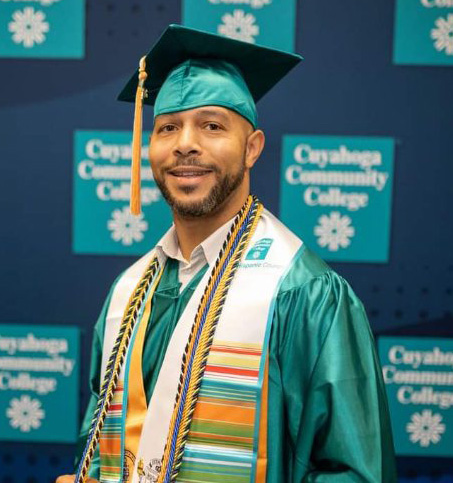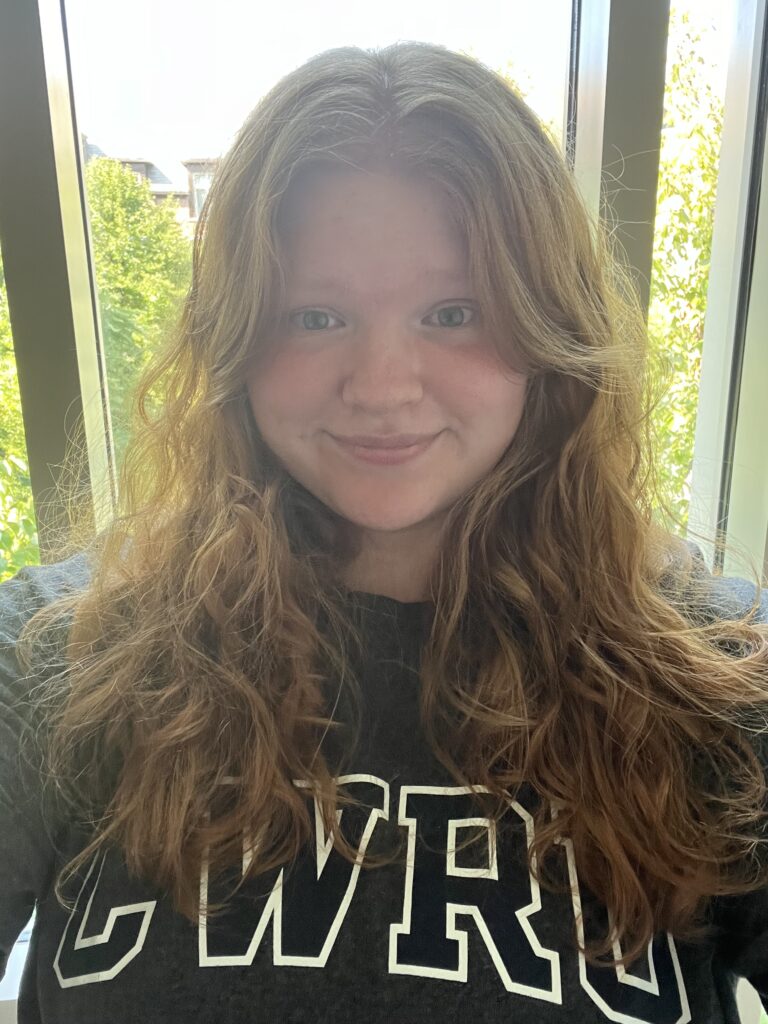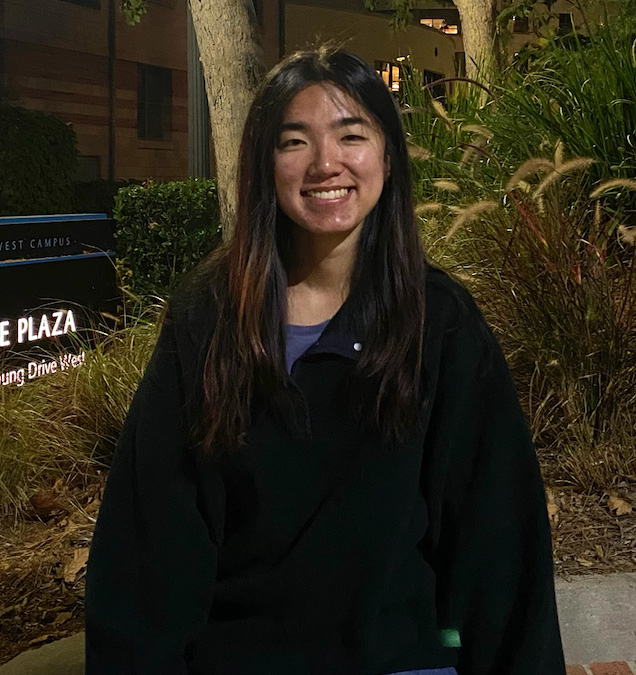Case Western Reserve University appeals to prospective students for a variety of reasons, whether it’s the university’s proximity to healthcare institutions, setting in a culturally dense part of an urban city, nationally ranked programs or something else entirely. For those who enroll elsewhere and then transfer to CWRU, the factors are often similar—but these students have especially clear ideas of what they want, and don’t want, in their college experiences.
In honor of National Transfer Student Week (Oct. 21–25), we spoke to four students who came to CWRU from other institutions. They shared what drew them to CWRU, how the university is helping them shape their futures, and what resources they were eager to take advantage of once they were here.
See what they had to say.
Answers have been lightly edited for length and clarity.
Jeremy Fleming
Pittsburgh native Jeremy Fleming attended Worcester Polytechnic Institute in Massachusetts before transferring to CWRU this year. Here, he is majoring in computer science with a minor in mathematics. He plans to graduate in 2027.

1. Can you describe your experience as a transfer student at Case Western Reserve University? What motivated you to transfer here?
Excellent! Both students and faculty have been outstanding, affirming my belief that I had made the right decision in transferring here.
I had no major issues with my previous institution. However, it was lacking in a few areas. I was looking for a university with more academic rigor and more career/club/research opportunities. Combining this with the much shorter distance from home made CWRU my top choice.
2. What challenges did you face during the transition to CWRU, and how did you overcome them?
I had anticipated a difficulty in integrating socially with my graduating class who presumably had already established social groups. However, I’ve been pleasantly surprised to experience a community that is beyond welcoming.
3. Were there any specific resources or support systems at Case Western Reserve University that aided in your transition as a transfer student?
During orientation week, myself and other transfer students had the opportunity to hear from other transfer students’ experiences transitioning to CWRU. Hearing advice from these students was helpful as they provided information that I wouldn’t find anywhere else.
4. Were there any extracurricular activities or organizations you found particularly welcoming as a transfer student?
So far, I’ve been involved in Cru, a Christian organization on campus, and a few major/career-related ones. All groups have added to my positive view of the CWRU community.
5. How has CWRU shaped your goals and aspirations?
Surrounded by a motivated community of students, I now feel more inclined to work to become my best self. Also, opportunities such as research (of which I am already involved in) have really helped me to have more clarity on which direction to pursue in my career.
6. Have there been any faculty or staff members at CWRU who have played a significant role in your transition and academic success?
My advisor and more broadly all of the academic advising faculty who are involved with transfer students have made the transfer process a breeze. Advisors were quick to respond to emails and helpful to provide detailed information sessions. In particular, this attentiveness really helped to ease a major stress point in my experience and that of most transfer students: course credits.
7. What would you most want others to know about being a transfer student at CWRU?
Being a transfer student at CWRU is unique in a lot of ways. Speaking from my experience and the input of my transfer peers, we come from backgrounds ranging from community colleges to large state schools. Transfers also tend to take courses in a different order than most (you’re likely to find a transfer student in a course typically taken in your first year). Moreover, transfer students are just as motivated as the rest of the students at CWRU and we’d love the opportunity to talk about our transfer experience.
Jose L. Fontanez Jr.
As part of the Cleveland Humanities Collaborative (CHC), Jose L. Fontanez Jr. came to CWRU from Cuyahoga Community College in fall 2023. He is majoring in English and education through the Integrated Language Arts program with plans to graduate in 2025.

1. Can you describe your experience as a transfer student at Case Western Reserve University? What motivated you to transfer here?
I’ve truly enjoyed my time at Case Western Reserve University. I’m a big fan of the learning environment. CWRU is a world-class academic institution, which means everyday I get to learn from accomplished professors and incredibly intelligent peers. There’s so much valuable perspective to gain here. I love being challenged and pushed to reach my potential, so there was no chance that I would turn down the chance to be a part of such a special learning community.
2. What challenges did you face during the transition to CWRU, and how did you overcome them?
CWRU is a big commitment because of the rigor and the demanding coursework. So, I made it my goal to use the first three weeks of class to establish routines for each course. Understanding what to do and when to do it is half the battle for me, so using the first three weeks to establish a workflow for the semester is a lifesaver. It’s so much easier to perform when you structure your workload.
3. Were there any specific resources or support systems at Case Western Reserve University that aided in your transition as a transfer student?
Dr. [Lisa] Nielson, Dr. [Kurt] Koenigsberger, and Dr. [Denise] Davis helped me to hit the ground running in both my majors, and my peers have been a tremendous source of encouragement.
4. Were there any extracurricular activities or organizations you found particularly welcoming as a transfer student?
The support I’ve received from my CHC family has been invaluable to me. CHC is a wonderful program to be a part of, and they made sure the transition wasn’t overwhelming for me. Not only has the CHC program welcomed me as a student, but it has also challenged me as a humanities student, and helped me to identify potential career opportunities that I can connect with post graduation.
5. How has CWRU shaped your goals and aspirations?
Being a student at CWRU has dramatically boosted my confidence as a professional. Succeeding in a highly demanding and competitive classroom environment lets me know that I’m capable of doing anything when I apply myself. My goals and aspirations have definitely become more ambitious and I’m looking forward to contributing to the field of education in ways that I previously hadn’t considered. Before arriving at CWRU, I wanted to be a teacher, and eventually a high school principal. Now I want to do those things in addition to developing programs and initiatives that help identify non-traditional and struggling students, and getting them reintegrated into the collegiate setting with support that can help them become successful students and professionals.
6. Have there been any faculty or staff members at CWRU who have played a significant role in your transition and academic success?
Dr. Nielson has been a lifeline for me. She does an amazing job of making herself available to students, answering questions, and being a source of encouragement. She’s been my “go-to” since I set foot on campus, and she’s the type of educator that I’ll emulate when I have students of my own. I have a tremendous amount of respect and admiration for the work she’s doing, and I’ll be looking for a hug from her on graduation day.
7. What would you most want others to know about being a transfer student at CWRU?
I want anyone considering transferring into CWRU to know that it represents a tremendous opportunity. CWRU is an incredible place to learn and grow, and they do a great job of backing their students. I also want potential transfers to know that while CWRU is very demanding and rigorous, it’s also a place you can succeed. It’s doable. If you plug into the resources available to our learning community, and embrace the grind, you’ll do well.
Emily Vasko
Originally from Boise, Emily Vasko began her college education at Arizona State University. A member of the Class of 2026, Vasko is now majoring in biochemistry and minoring in chemistry at CWRU. She arrived at CWRU in fall 2023.

1. Can you describe your experience as a transfer student at Case Western Reserve University? What motivated you to transfer here?
I transferred to Case Western Reserve University from Arizona State because I struggled with the large campus and overwhelming environment there. I was looking for a more intimate setting where I could thrive academically and personally. One of the main things that motivated me to transfer here was the smaller student population at CWRU. I have been able to foster closer relationships with professors and fellow students. On a daily basis I run into at least seven to eight people I know walking around and when you do not know someone it is likely that one of your friends does because the school is just so connected. Additionally, the university offers numerous pre-med opportunities that align with my career goals.
2. What challenges did you face during the transition to CWRU, and how did you overcome them?
I think sometimes being a transfer student in general can be frustrating at first because you can feel like you missed experiences when people in your year talk about things you were not there for and it can make it feel more daunting to try to connect with people from your own class year. I was really lucky that while I was randomly assigned roommates all of them were amazing and two of the others were transfer students but in my classes and clubs I just had to put myself out there. A lot of the friends I have now are because I purposefully went out and tried to interact with people and get to know more people at CWRU.
3. Were there any specific resources or support systems at Case Western Reserve University that aided in your transition as a transfer student?
The Office of Orientation and New Student Transitions specifically held a few orientation sessions for transfer students which helped me meet other transfer students and just get to know other people in the same situation as me. I found those sessions to be really helpful and I made some great friends at those events.
4. Were there any extracurricular activities or organizations you found particularly welcoming as a transfer student?
I feel like most organizations and extracurriculars have been welcoming, I have not come across one that has not been welcoming. I think most places and/or people do not see it as that big of a deal. It can actually be a conversation starter since people might ask why you transferred or where you transferred from. I will say that some specific clubs I am in like The Alliance for Non-Traditional and Transfer Students as well as CCEL have been extra welcoming and so easy to get involved in.
5. How has CWRU shaped your goals and aspirations?
Starting at CWRU, I was pre-med and knew that I wanted to be a biochemistry major but the last year and a half at CWRU have really put this plan into action. Through help from the pre-med advisors and all of the available resources around CWRU for pre-meds, I have gotten opportunities like shadowing in the Cleveland Clinic ER and volunteering at an assisted living facility. I was actually even able to get my CNA certification here in Cleveland after being recommended to look into it by a pre-med advisor and was able to work as a nursing assistant back home this past summer.
6. Have there been any faculty or staff members at CWRU who have played a significant role in your transition and academic success?
The pre-med advisors have been so helpful in giving advice and recommendations on what I should do next. I also have just loved most of my professors at CWRU and you can tell they are passionate as well as knowledgeable about their field and teaching. Having professors like that helped me a lot because they care about their students and want to make sure you are doing well.
7. What would you most want others to know about being a transfer student at CWRU?
It can seem scary or intimidating at first but it is going to be OK. You just need to make sure you are making an effort to do things and to put yourself out there. That does not mean you need to be super extroverted, but you also can’t think that people are just going to somehow find you when you do not put in any effort. Even outside of friends, all of the opportunities I have gotten so far I have gotten because I asked myself the question, “What is the worst that could happen?” Most of the time the worst thing that could happen is someone saying no and I have been pushing myself over the last year to realize that the possibility of someone saying no is not a good enough reason to not try. I am overall really happy that I transferred to Case Western Reserve and I hope that others can find that here as well.
Bowen Zhang
Bowen Zhang left her hometown of Cleveland to attend UCLA, but decided to return home to attend Case Western Reserve in fall 2023. Now a member of the Class of 2026, she is majoring in neuroscience with a minor in apple data science.

1. Can you describe your experience as a transfer student at Case Western Reserve University? What motivated you to transfer here?
One of my main motivators was that I felt homesick and also got sick a lot during my freshman year. I don’t think I was independent enough to move that far from home yet. Another reason was because I felt very lost in a bigger school and wanted a smaller setting.
2. What challenges did you face during the transition to CWRU, and how did you overcome them?
One challenge I faced was rebuilding my social circle and making new friends. I felt that a lot of my peers, especially people in my class, had already established their place at CWRU. I also felt “a year behind” everyone else in terms of my knowledge around campus, classes and joining clubs. However, I think things just naturally became easier because I joined more clubs and put myself out there to meet more people. What makes a place feel like home for me is definitely the people that I surround myself with.
3. Were there any specific resources or support systems at Case Western Reserve University that aided in your transition as a transfer student?
Last year I went to some peer tutoring and Writing Center appointments. These supplemental learnings were very helpful in solidifying the concepts I learned in class or getting clarification on a 1:1 session with another peer.
4. Were there any extracurricular activities or organizations you found particularly welcoming as a transfer student?
On the first day of class, I went to Spartan Running Club. I actually met two of my close friends there and the club itself is filled with some of the most welcoming and down-to-earth people!
5. How has CWRU shaped your goals and aspirations?
I think CWRU has amazing opportunities for STEM-related majors, especially anything in healthcare. I’ve been able to get involved in research, EMT, and have premed advising sessions.
CWRU is also sandwiched between three hospitals; this proximity creates great opportunities for shadowing and networking. I also did a short-term study abroad during spring break last year. This experience was very eye-opening and made me realize that post-grad, I want to spend some time outside of the U.S. The different people, cultures and perspectives enrich my own.
6. Have there been any faculty or staff members at CWRU who have played a significant role in your transition and academic success?
I took CHEM 233/234 with Dr. [Fu-Sen] Liang last year. I struggled with organic chemistry but I went to his office hours a lot and he was very open to help explain everything from the ground up. I also talked to him about my doubts for medical school and what I want to do in the future, and he was quite understanding and genuinely wants his students to succeed.
7. What would you most want others to know about being a transfer student at CWRU?
My advice would be that the experience is what you make of it. You should be proactive in seeking out resources. Some examples: Kelvin Smith Library has a research database that has subscriptions to many paid journal sites, the Writing Center can help with resume and scientific writing in addition to humanities, and explore the RTA routes. Lastly, find good study spots!
Interested in transferring to Case Western Reserve University? Attend an upcoming information session, review details about the process and credit transfer and complete your application by Nov. 15 for a spring semester start.
